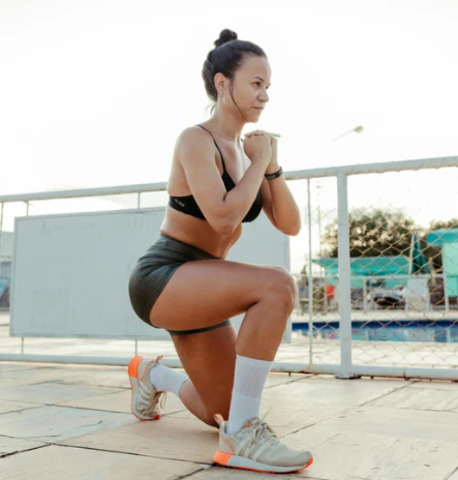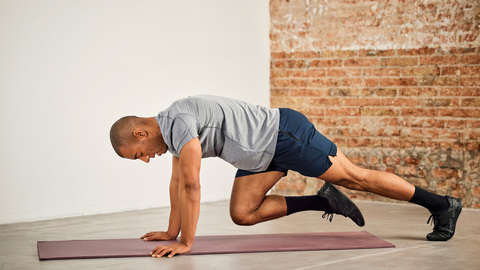
Keep your body healthy
One of the many benefits of functional fitness training is its ability to improve performance in everyday activities. This type of training focuses on developing overall physical fitness which helps your body move with more ease and efficiency. Instead of focusing just on losing weight or building muscle, you will develop overall physical competence. By focusing on functional fitness you can reduce your risk of injuries and improve your physical abilities.
Additionally, functional fitness may improve your mental wellbeing. Functional fitness challenges both your mind and your body. It may help boost your mood, lower stress levels, and improve your self-esteem. If you take group fitness classes, it can create a community and support, and can help you stay motivated and dedicated to your training and fitness goals.
Injury Prevention
Functional fitness trains your muscles in your whole body to work together, the way they do in daily life. Working out this way can increase your overall strength, coordination, and stability. This type of training is also useful if you like to play sports. During functional fitness training, you learn to engage multiple muscle groups at once which can prevent common sports injuries such as sprains, strains and tendonitis. With this type of training you can lower the risk of chronic injuries such as lower back pain. Functional fitness trains your core which helps support your spine and help with alignment and posture, which can reduce stress on your back and prevent pain.
Move through your day with ease.
The main focus of functional fitness training is to improve your daily life and movements. To be able to perform daily tasks with ease, strength, comfort, and without pain. Regular tasks such as lifting your children, carrying groceries and sitting in a chair without pain. Everyone can, and should, work on functional fitness, regardless of age or fitness level. It doesn’t require a gym membership or expensive equipment. All you have to do is learn to move your body in new ways and to adapt to these movements in your daily life.
Functional fitness provides many benefits to your health and well-being. It increases mobility and reduces the chances of injury. By incorporating functional fitness exercises into your routine, you can increase endurance and strength. It can also help reduce stress levels, boost your mood, and help maintain your independence. It is versatile and you can tailor it to your specific needs to find what works best for your body.
Improve Power
Functional fitness is all about training your body for the things you actually do in daily life, not just how much you can bench. Instead of isolating one muscle at a time, these workouts use compound movements like lunges, squats, and push-ups to build real-world strength. The goal? Move better, lift smarter, and feel stronger doing everyday things.
To boost power, trainers will often use high-intensity interval training (HIIT)—quick bursts of all-out effort followed by short recovery periods. Think a round of burpees, a set of jumping jacks, a 30-second rest and then back at it. It’s tough, but it builds endurance and explosiveness in a sustainable way, without endless hours in the gym
Functional fitness programs also lean into practical movements like farmer’s walks, kettlebell swings, and overhead squats, exercises that prepare your body for carrying groceries, lifting luggage, or hoisting a toddler without pulling a muscle. It helps make all your daily activities more manageable and pain free. Balance and stability work, such as single-leg squats and planks, help tie it all together, improving coordination and protecting you from injury. It’s fitness that works as hard as you do. By working on functional fitness, you can improve your confidence and independence in your daily life and help to prevent injuries.
More Energy
Functional fitness does more than just build strength, it can improve your energy levels. Because these workouts fire up multiple muscle groups at once, your body works harder, burns more calories, and keeps your metabolism going long after you’re done. That means more stamina for the rest of your day and fewer mid-afternoon crashes.
It also improves your VO₂ max, which is basically your body’s ability to use oxygen efficiently. The better your VO₂ max, the easier everything feels, from climbing stairs to chasing your dog around the park. Plus, like most good workouts, functional fitness does wonders for your mood. It releases stress, sharpens focus, and leaves you feeling more alert and upbeat.
If you’re looking for more energy and better overall fitness, try adding functional training to your weekly routine. A certified trainer can help tailor the right mix of movements for your goals and schedule. Even short, focused sessions can deliver major results without taking up too much of your day. Imagine being able to power through your day instead of dragging yourself through it.
Improve athletic performance.
Functional fitness training is not only good for daily life and activities but is hugely beneficial for sports performance. Let's start with the core. A strong core is crucial for not only daily life, but also for sports. Functional fitness training targets the entire core which helps support the body’s stability. A strong core is essential for sports performance because it helps with posture and balance. In tennis a strong core helps with strong serves and return hits and in running where a strong core helps you maintain a better stride and helps you avoid injuries.
Functional fitness uses compound exercises that work multiple muscle groups at the same time. A couple examples are squats and deadlifts. These are very effective in building strength and endurance and improving athletic performance. They are commonly used by athletes of all sports to improve their training and performance.
Functional fitness training also enhances coordination and balance. These are crucial for athletes. With functional fitness training you learn to move your body through various planes of motion to improve balance and coordination. This is very beneficial for sports like basketball or football that regularly require quick changes in direction.
Coaches and athletes of all levels understand the significance and effects of functional fitness training. They incorporate the training into their programs to improve athletic performance. Coaches say they have witnessed significant improvements in performance and overall fitness when incorporating functional fitness training.
With functional fitness training you target multiple muscle groups in a comprehensive workout to improve overall fitness and performance. This is an effective way to build strength, flexibility, and endurance. They also improve balance and coordination. All of this is essential for good health and can help reduce the chance of falls and injuries, not only for athletes but for everyone.
Functional fitness training also provides a cardio workout, which is necessary for maintaining good health. Exercises such as burpees and jump squats, which are common in functional fitness training, raise your heart rate which improves heart health. This type of training is especially beneficial for individuals who struggle with traditional cardio workouts due to time or physical limitations.
Functional fitness training can be customized to meet individual needs and abilities. Coaches or trainers can modify exercises to accommodate different fitness levels and goals. For example, squats can be modified based on flexibility limitations.
Functional fitness training is gaining popularity due to its holistic approach to fitness. It provides a comprehensive workout that improves strength, endurance, flexibility, balance, and coordination. Functional fitness is an excellent workout for those seeking to enhance overall fitness and athletic performance, and improve overall health and well-being. It positively impacts overall health and well-being by improving strength and endurance for daily activities.
Get strong.
Functional fitness focuses on enhancing strength, flexibility, and mobility through full-body movements that mimic real-life activities. Traditional weightlifting, while great for other reasons, isolates specific muscle groups. Functional fitness exercises engage multiple muscle groups at the same time, providing a more comprehensive workout that can improve overall fitness and reduce the risk of injury.
Versatility is another great benefit of functional fitness. It can be adapted to suit any fitness level, body, or goal. If you are a beginner looking to build strength and endurance or even an experienced athlete who wants to improve performance, functional fitness training can help you. Additionally, you will engage multiple muscle groups at once which will give you a cardiovascular workout . This can help you burn calories, may help you lose weight, and can improve heart health.
Improved mental clarity.
Functional fitness doesn’t just build muscle,it sharpens your mind, too. Because these workouts engage multiple muscle groups at once, they demand coordination, balance, and focus, turning every session into both a physical and mental workout. The brain has to stay dialed in, improving concentration and body awareness along the way.
Many programs also blend in mindfulness and relaxation techniques like stretching or short meditations. These moments help lower stress levels, support recovery, and boost mental clarity long after the workout’s done.
That mind-body connection carries over into everyday life. People who train functionally often notice better focus, sharper memory, and improved stress management. It’s not just fitness, it’s a reset for your body and your brain.
Boost self-confidence.
Building functional fitness isn’t just about getting stronger, it’s about feeling stronger. When everyday tasks start to feel effortless, confidence naturally follows. That sense of capability often spills into other parts of life, from your career to your relationships. It’s a quiet kind of empowerment that comes from knowing your body can handle whatever’s thrown your way.
Functional training also shifts the focus inward. Instead of comparing yourself to others, you’re tracking your own progress—lifting a little heavier, moving a little smoother, feeling a little more in tune with your body. For anyone who’s ever struggled with body image or self-doubt, that mindset shift can be game-changing.
Another plus: functional fitness is easily adaptable. Whether you’re coming back from an injury, managing a chronic condition, or just starting out, a trainer can help design a program that meets you where you are. You can push as hard, or as gently, as you need, all while building strength, mobility, and self-confidence on your own terms.
Functional fitness training may be new to you, but it’s one of the most effective ways to enhance real-life strength and boost overall well-being. Unlike traditional workouts that often repeat the same movements or target isolated muscles, functional fitness emphasizes movement patterns you use in everyday life. The more that I looked into functional fitness, the more experts I found talking about the benefits of functional fitness and providing practical tips for incorporating it into your routine. Instead of isolating muscles or relying solely on conventional cardio, this training style engages your entire body—helping you move better, stay healthier, and build lasting strength.
Keep your body healthy
One of the many benefits of functional fitness training is its ability to improve performance in everyday activities. This type of training focuses on developing overall physical fitness which helps your body move with more ease and efficiency. Instead of focusing just on losing weight or building muscle, you will develop overall physical competence. By focusing on functional fitness you can reduce your risk of injuries and improve your physical abilities.
Additionally, functional fitness may improve your mental wellbeing. Functional fitness challenges both your mind and your body. It may help boost your mood, lower stress levels, and improve your self-esteem. If you take group fitness classes, it can create a community and support, and can help you stay motivated and dedicated to your training and fitness goals.
Injury Prevention
Functional fitness trains your muscles in your whole body to work together, the way they do in daily life. Working out this way can increase your overall strength, coordination, and stability. This type of training is also useful if you like to play sports. During functional fitness training, you learn to engage multiple muscle groups at once which can prevent common sports injuries such as sprains, strains and tendonitis. With this type of training you can lower the risk of chronic injuries such as lower back pain. Functional fitness trains your core which helps support your spine and help with alignment and posture, which can reduce stress on your back and prevent pain.
Move through your day with ease.
The main focus of functional fitness training is to improve your daily life and movements. To be able to perform daily tasks with ease, strength, comfort, and without pain. Regular tasks such as lifting your children, carrying groceries and sitting in a chair without pain. Everyone can, and should, work on functional fitness, regardless of age or fitness level. It doesn’t require a gym membership or expensive equipment. All you have to do is learn to move your body in new ways and to adapt to these movements in your daily life.
Functional fitness provides many benefits to your health and well-being. It increases mobility and reduces the chances of injury. By incorporating functional fitness exercises into your routine, you can increase endurance and strength. It can also help reduce stress levels, boost your mood, and help maintain your independence. It is versatile and you can tailor it to your specific needs to find what works best for your body.
Improve Power
Functional fitness is all about training your body for the things you actually do in daily life, not just how much you can bench. Instead of isolating one muscle at a time, these workouts use compound movements like lunges, squats, and push-ups to build real-world strength. The goal? Move better, lift smarter, and feel stronger doing everyday things.
To boost power, trainers will often use high-intensity interval training (HIIT)—quick bursts of all-out effort followed by short recovery periods. Think a round of burpees, a set of jumping jacks, a 30-second rest and then back at it. It’s tough, but it builds endurance and explosiveness in a sustainable way, without endless hours in the gym
Functional fitness programs also lean into practical movements like farmer’s walks, kettlebell swings, and overhead squats, exercises that prepare your body for carrying groceries, lifting luggage, or hoisting a toddler without pulling a muscle. It helps make all your daily activities more manageable and pain free. Balance and stability work, such as single-leg squats and planks, help tie it all together, improving coordination and protecting you from injury. It’s fitness that works as hard as you do. By working on functional fitness, you can improve your confidence and independence in your daily life and help to prevent injuries.
More Energy
Functional fitness does more than just build strength, it can improve your energy levels. Because these workouts fire up multiple muscle groups at once, your body works harder, burns more calories, and keeps your metabolism going long after you’re done. That means more stamina for the rest of your day and fewer mid-afternoon crashes.
It also improves your VO₂ max, which is basically your body’s ability to use oxygen efficiently. The better your VO₂ max, the easier everything feels, from climbing stairs to chasing your dog around the park. Plus, like most good workouts, functional fitness does wonders for your mood. It releases stress, sharpens focus, and leaves you feeling more alert and upbeat.
If you’re looking for more energy and better overall fitness, try adding functional training to your weekly routine. A certified trainer can help tailor the right mix of movements for your goals and schedule. Even short, focused sessions can deliver major results without taking up too much of your day. Imagine being able to power through your day instead of dragging yourself through it.
Improve athletic performance.
Functional fitness training is not only good for daily life and activities but is hugely beneficial for sports performance. Let's start with the core. A strong core is crucial for not only daily life, but also for sports. Functional fitness training targets the entire core which helps support the body’s stability. A strong core is essential for sports performance because it helps with posture and balance. In tennis a strong core helps with strong serves and return hits and in running where a strong core helps you maintain a better stride and helps you avoid injuries.
Functional fitness uses compound exercises that work multiple muscle groups at the same time. A couple examples are squats and deadlifts. These are very effective in building strength and endurance and improving athletic performance. They are commonly used by athletes of all sports to improve their training and performance.
Functional fitness training also enhances coordination and balance. These are crucial for athletes. With functional fitness training you learn to move your body through various planes of motion to improve balance and coordination. This is very beneficial for sports like basketball or football that regularly require quick changes in direction.
Coaches and athletes of all levels understand the significance and effects of functional fitness training. They incorporate the training into their programs to improve athletic performance. Coaches say they have witnessed significant improvements in performance and overall fitness when incorporating functional fitness training.
With functional fitness training you target multiple muscle groups in a comprehensive workout to improve overall fitness and performance. This is an effective way to build strength, flexibility, and endurance. They also improve balance and coordination. All of this is essential for good health and can help reduce the chance of falls and injuries, not only for athletes but for everyone.
Functional fitness training also provides a cardio workout, which is necessary for maintaining good health. Exercises such as burpees and jump squats, which are common in functional fitness training, raise your heart rate which improves heart health. This type of training is especially beneficial for individuals who struggle with traditional cardio workouts due to time or physical limitations.
Functional fitness training can be customized to meet individual needs and abilities. Coaches or trainers can modify exercises to accommodate different fitness levels and goals. For example, squats can be modified based on flexibility limitations.
Functional fitness training is gaining popularity due to its holistic approach to fitness. It provides a comprehensive workout that improves strength, endurance, flexibility, balance, and coordination. Functional fitness is an excellent workout for those seeking to enhance overall fitness and athletic performance, and improve overall health and well-being. It positively impacts overall health and well-being by improving strength and endurance for daily activities.
Get strong.
Functional fitness focuses on enhancing strength, flexibility, and mobility through full-body movements that mimic real-life activities. Traditional weightlifting, while great for other reasons, isolates specific muscle groups. Functional fitness exercises engage multiple muscle groups at the same time, providing a more comprehensive workout that can improve overall fitness and reduce the risk of injury.
Versatility is another great benefit of functional fitness. It can be adapted to suit any fitness level, body, or goal. If you are a beginner looking to build strength and endurance or even an experienced athlete who wants to improve performance, functional fitness training can help you. Additionally, you will engage multiple muscle groups at once which will give you a cardiovascular workout . This can help you burn calories, may help you lose weight, and can improve heart health.
Improved mental clarity.
Functional fitness doesn’t just build muscle,it sharpens your mind, too. Because these workouts engage multiple muscle groups at once, they demand coordination, balance, and focus, turning every session into both a physical and mental workout. The brain has to stay dialed in, improving concentration and body awareness along the way.
Many programs also blend in mindfulness and relaxation techniques like stretching or short meditations. These moments help lower stress levels, support recovery, and boost mental clarity long after the workout’s done.
That mind-body connection carries over into everyday life. People who train functionally often notice better focus, sharper memory, and improved stress management. It’s not just fitness, it’s a reset for your body and your brain.
Boost self-confidence.
Building functional fitness isn’t just about getting stronger, it’s about feeling stronger. When everyday tasks start to feel effortless, confidence naturally follows. That sense of capability often spills into other parts of life, from your career to your relationships. It’s a quiet kind of empowerment that comes from knowing your body can handle whatever’s thrown your way.
Functional training also shifts the focus inward. Instead of comparing yourself to others, you’re tracking your own progress—lifting a little heavier, moving a little smoother, feeling a little more in tune with your body. For anyone who’s ever struggled with body image or self-doubt, that mindset shift can be game-changing.
Another plus: functional fitness is easily adaptable. Whether you’re coming back from an injury, managing a chronic condition, or just starting out, a trainer can help design a program that meets you where you are. You can push as hard, or as gently, as you need, all while building strength, mobility, and self-confidence on your own terms.

Train for Life, Not Just for the Gym
Functional fitness isn’t just a workout, it’s a way of moving through life with more strength, balance, and purpose. By training your muscles to work together, you build a foundation that supports everything from hauling groceries to crushing your next workout. What makes it stand out is its flexibility: it adapts to your body, your goals, and your pace, no matter your age or experience level.
The benefits go far beyond the physical. Functional fitness sharpens focus, boosts confidence, and encourages mindfulness with every rep. It’s about moving intentionally, pushing your limits safely, and feeling capable in your own skin. Whether you’re chasing athletic goals, more energy, or just an easier time getting through the day, this approach helps you move better and feel stronger in every part of life.
Stay consistent, keep challenging yourself, and remember, every squat, lunge, and lift is an investment in your future. Functional fitness builds not just a powerful body, but the resilience and confidence to live life fully and fearlessly.
Related posts




